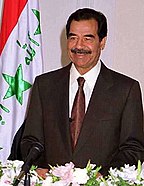Background
The election was prompted by the August defection to Jordan of senior government officials Hussein Kamel al-Majid and Saddam Kamel and their wives. During the crisis that followed, Saddam took steps to control the damage; the referendum was an attempt to shore up his claim to legitimacy. [7] At a September 7 meeting of the RCC, an interim amendment to the Constitution was approved whereby its chairman would automatically assume the presidency, subject to approval of the National Assembly and endorsement by national plebiscite. Parliament approved his candidacy on September 10, setting the stage for the meticulously organised election. [6]
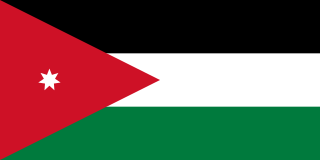
Jordan, officially the Hashemite Kingdom of Jordan, is an Arab country in Western Asia, on the East Bank of the Jordan River. Jordan is bordered by Saudi Arabia to the south, Iraq to the north-east, Syria to the north and Israel and Palestine to the west. The Dead Sea is located along its western borders and the country has a small coastline to the Red Sea in its extreme south-west, but is otherwise landlocked. Jordan is strategically located at the crossroads of Asia, Africa and Europe. The capital, Amman, is Jordan's most populous city as well as the country's economic, political and cultural centre.
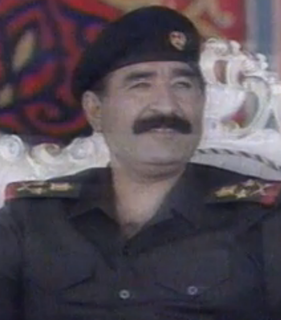
Hussein Kamel Hassan al-Majid was the son-in-law and second cousin of Iraqi leader Saddam Hussein. He defected to Jordan and assisted United Nations Special Commission (UNSCOM) and International Atomic Energy Agency (IAEA) inspection teams assigned to look for weapons of mass destruction in Iraq.

Saddam Kamel Hassan al-Majid (1956-1996) was the second cousin and son-in-law of deposed Iraqi President Saddam Hussein.
Prior to the election, Ba'ath Party members visited homes, making sure to ask if households had ration cards (at the time, food was scarce as a result of the Iraq sanctions); the clear implication was that the wrong kind of vote could mean no food. [8] Voters were required to name relatives on their ballots and, according to some opposition reports, were threatened with punishment against their families if they voted "no". In a November report, the UN Special Rapporteur noted that because of the intrusiveness of the security apparatus "virtually no citizen would risk demonstrating any opposition to the Presidency or Government—or would do so at his mortal peril"; [9] the notion that opponents would face some sort of retribution was shared by most observers. [10] During the election, which served to emphasize that the Baath Party and the RCC were the country's true centres of power, loyal and tenacious party cadres brought voters in droves to the polling stations, [11] themselves swamped with pro-Hussein propaganda. [12] The result confirmed that Iraqis' fear of Saddam was greater than the severe hardship that had resulted from the sanctions. [13]

The Arab Socialist Ba'ath Party – Iraq Region, officially the Iraqi Regional Branch, is an Iraqi Ba'athist political party founded in 1951 by Fuad al-Rikabi. It was the Iraqi regional branch of the original Ba'ath Party before changing its allegiance to the Iraqi-dominated Ba'ath movement following the 1966 split within the original party. The party was officially banned following the American invasion of Iraq, but despite this it still continues to function.
Preparations
The campaign involved unending glorification of Saddam; for instance, General Ali Hassan al-Majid declared, "O lofty mountain! O glory of Iraq! By God we have always found you in the most difficult conditions a roaring lion and a courageous horseman, one of the few true men". [14] Saddam himself never appeared in public prior to the election, but paid supporters streamed through the streets, shouting "Naam, naam, Saddam" ("Yes, yes, Saddam"). A highlight came four days prior to the vote at an Iraq-Qatar football game, when a dejected, pensive-looking Uday Hussein (normally glamorized) was shown on television, upset by what the announcer claimed was a (probably fictitious) fire that Saddam had set to his expensive cars as punishment for attacking Watban Ibrahim al-Tikriti and for the defections; soon afterward, Uday's role was increased as he sought to lure the men and their wives back to Iraq. [3]
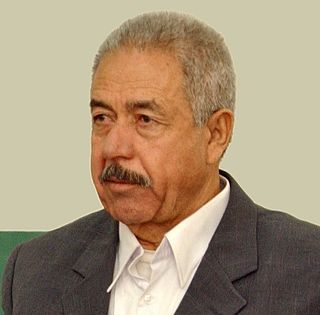
Ali Hassan Abd al-Majid al-Tikriti was a Ba'athist Iraqi Defense Minister, Interior Minister, military commander and chief of the Iraqi Intelligence Service. He was also the governor of Kuwait during the Iraqi invasion of Kuwait.

The Iraq national football team represents Iraq in international football. The team is known by its fans as Asood Al-Rafidain, which means Lions of Mesopotamia, and is controlled by the Iraq Football Association (IFA), which is currently a member of the Asian Football Confederation (AFC) as well as the West Asian Football Federation (WAFF), the Union of Arab Football Associations (UAFA) and the Arab Gulf Cup Football Federation (AGCFF).
The Qatar national football team is the national team of Qatar and is overseen by the Qatar Football Association.
Confident of popular participation, the government invited some 500 foreign journalists to witness the exercise; turnout (at least in Baghdad) was large enough to impress the visiting reporters, although the official figure was doubtless exaggerated. [14] One Western ambassador was impressed by the show of force involved, including a unanimous vote from Karbala (centre of the 1991 Shiite uprising against Saddam): "If this referendum proves anything, it is that the party is firmly in control of Iraq and Saddam runs it with an iron fist. If they can organize a referendum like this in less than three weeks, mobilize party cadres in every village, hamlet, town and city, produce precise lists for eight million voters and march all of them to the polls to say 'yes' unanimously, it means they are not about to fall". [15]

Karbala, also Kerbala, is a city in central Iraq, located about 100 km (62 mi) southwest of Baghdad, and a few dozen miles east of Lake Milh. Karbala is the capital of Karbala Governorate, and has an estimated population of 700,000 people (2015).
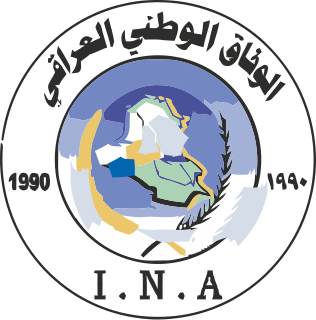
The Iraqi National Accord, known inside Iraq as Wifaq, is an Iraqi political party founded by Iyad Allawi, Tahsin Muallah and Salah Omar al-Ali in 1991.
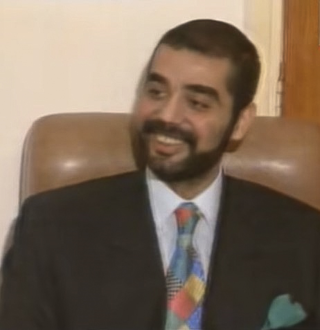
Uday Saddam Hussein al-Tikriti was the eldest child of Saddam Hussein by his first wife, Sajida Talfah, and the brother of Qusay Hussein. Uday was seen, for several years, as the likely successor to his father, but lost the place as heir apparent to Qusay due to injuries he sustained in an assassination attempt, his increasingly erratic behavior, and his troubled relationship with the family.

During the 2003 invasion of Iraq by a United States-led coalition, the U.S. military developed a set of playing cards to help troops identify the most-wanted members of President Saddam Hussein's government, mostly high-ranking members of the Iraqi Regional Branch of the Arab Socialist Ba'ath Party or members of the Revolutionary Command Council. The cards were officially named the "personality identification playing cards". As of 2018, all but 6 of the 52 most wanted have been either killed, or captured.
The Iraqi Revolutionary Command Council was established after the military coup in 1968, and was the ultimate decision making body in Iraq before the 2003 American-led invasion. It exercised both executive and legislative authority in the country, with the Chairman and Vice Chairman chosen by a two-thirds majority of the council. The Chairman was also then declared the President of Iraq and he was then allowed to select a Vice President. After Saddam Hussein became President of Iraq in 1979 the council was led by deputy chairman Izzat Ibrahim ad-Douri, deputy Prime Minister Tariq Aziz, and Taha Yassin Ramadan, who had known Saddam since the 1960s. The legislature was composed of the RCC, the National Assembly and a 50-member Kurdish Legislative Council which governed the country. During his presidency, Saddam was Chairman of the RCC and President of the Republic. Other members of the RCC included Salah Omar Al-Ali who held the position between 1968 and 1970, one of Saddam's half-brothers, Barzan Ibrahim al-Tikriti, Taha Yasin Ramadan, Adnan Khairallah, Sa'adoun Shaker Mahmoud, Tariq Aziz Isa, Hasan Ali Nassar al-Namiri, Naim Hamid Haddad and Taha Mohieddin Maruf. It was officially dissolved on 23 May 2003 by Paul Bremer per Order Number 2 of the Coalition Provisional Authority.
Rana Saddam Hussein is the second-eldest daughter of the former President of Iraq, Saddam Hussein and his first wife, Sajida Talfah. Her older sister is Raghad and younger sister is Hala Hussein.

Lieutenant General Abid Al-Hamid Mahmud al-Tikriti was an Iraqi military officer under Saddam Hussein's deposed government.
Elections in Iraq gives information on election and election results in Iraq.
The Reconciliation and Liberation Bloc or Kutla al-Musalaha wa't-Tahrir was an Iraqi political party. The Sunni, liberal, and secularist party was founded as the Iraqi Homeland Party in Jordan in 1995 by exiles from Saddam's regime. A prominent member was Saddam's son-in-law Hussein Kamel al-Majid. The party is closely linked to the powerful Juburi tribe and its current head is Mish'an al-Juburi. The party is also supported by former Ba'athists and the party has pushed for the reintegration of members of the old regime. Unlike many Sunni parties it decided not to boycott the January 2005 Iraqi election. In the voting it received some 31,000 votes, enough for one seat in the legislature. During the subsequent December elections, it increased its representation to 3 seats.
The Al-Bu Nasir is one of a number of Arab tribes in Iraq. It is a Sunni Arab tribe comprising some 30,000 people who primarily inhabit the town of Tikrit and the surrounding area of northern central Iraq, as well as many other area in south and center of Iraq. Although not very numerous, the Al-Bu Nasir nonetheless obtained a reputation of being "a difficult lot of people, cunning and secretive, whose poverty drove most of them to pervert the Bedouins' legendary qualities of being warlike and fearless." Like many Iraqi tribes, it follows the Hanafi fiqh and it traced its origins to the Arabian peninsula and maintained cordial ties with other related clans and tribes.
The Directorate of General Security (DGS) also called Internal State Security, مديرية الأمن العام, secret police or some variation thereof was a domestic Iraqi intelligence agency.

A referendum was held in Iran on 26 January 1963 by the decree of Mohammad Reza Shah, with an aim to show popular support for him, asking voters to approve or veto the reforms of the White Revolution.

Adnan Khairallah, was Saddam Hussein's brother-in-law and cousin. He held several titles and was a member of the Iraqi Revolutionary Command Council. He also served as the Defence Minister of Iraq from 1979 to his death, having been appointed days after Saddam Hussein succeeded to the Presidency. He died in 1989 in a helicopter crash that was officially labeled an accident. The circumstances surrounding his death, including his disputes with Saddam and rumors of a potential coup have led some to believe Khairallah was assassinated under orders from Saddam.

House of Saddam is a 2008 drama that charted the rise and fall of Saddam Hussein. A co-production between BBC Television and HBO Films, the series was first broadcast on BBC Two in four parts between 30 July and 20 August 2008.

Presidential elections were held in the Republic of Iraq on October 16, 2002, the second under the rule of Saddam Hussein. According to official statistics, the turnout was 100%, with all 11,445,638 Iraqis registered to vote having voted "yes" in a referendum whether to support another seven year-term for President Saddam Hussein, which would legally have ended in 2009.
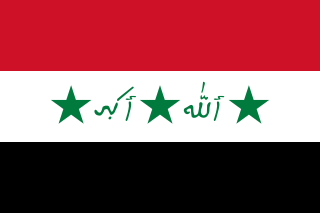
Ba'athist Iraq, formally the Iraqi Republic, covers the history of Iraq between 1968 and 2003, during the period of the Arab Socialist Ba'ath Party's rule. This period began with high economic growth and soaring prosperity, but ended with Iraq facing social, political, and economic stagnation. The average annual income decreased because of several external factors, and several internal policies of the government.
Abd al-Khaliq al-Samarra'i was an Iraqi Ba'athist politician and leading member of the Arab Socialist Ba'ath Party in Iraq. He was a member of the Regional Command from 1964 to 1973, and considered a serious rival of Saddam Hussein for leadership of the civilian faction of the Ba'ath Party. He was arrested in 1973 for his alleged involvement in a plot to overthrow the government, and executed in 1979 by Hussein.
The Tulfah family was the family of President Saddam Hussein of Ba'athist Iraq who ruled from 1979 to 2003 and established a single party authoritarian dictatorship under the control of the Ba'ath Party until the invasion by US/UK forces in 2003.


